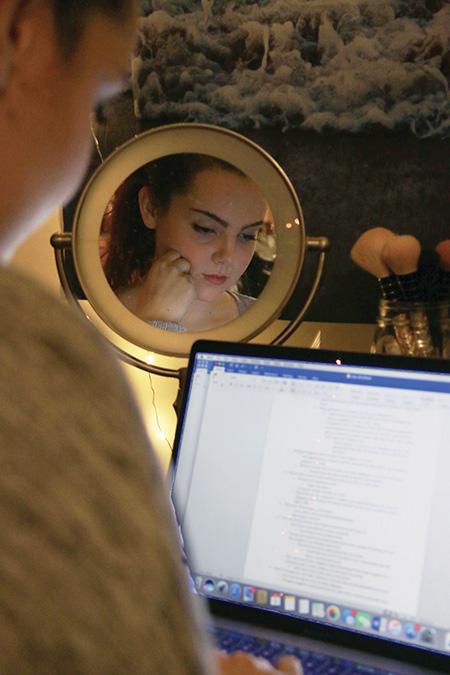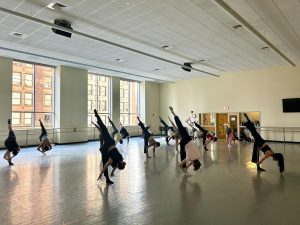Playwriting returns with enrollment reaching capacity
Theatre arts expands curriculum toward cross-disciplinary
Photo by Nikole Kost
Allison Beauregard, sophomore acting major, is enrolled in Playwriting I. She wanted to try something new and become comfortable sharing her writing.
January 10, 2017
While pursuing a career in the field of musical theatre or acting, students typically work toward finding their voice on stage. During their time at Point Park, some may find their voice on paper.
This spring semester revived a playwriting course that offers students an alternate creative outlet with the potential to bring out hidden talents. The class will focus on the main elements of writing, live changes that affect how the story is told, as well as development necessary in a script before being brought to life in a performance.
Playwriting has been available on and off, usually due to low enrollment, for the past five years under famous Pittsburgh playwright and winner of the Francesca Primus Prize from the American Theatre Critics Association Tammy Ryan. The course will now be taught by Molly Rice, who has been writing her own plays since 2001.
“I want them to be excited,” Rice said. “The environment we create will be created together. What they’re interested in matters to me.”
Rice originally began her career as an actress in experimental theatre until one day realizing “everyone was looking.”
“It was like Adam and Eve when they realize they’re naked,” Rice said. “But I [thought] it was my body’s way of shifting [into becoming a playwright].”
The course also hopes to focus on performers shifting to a completely different side of their craft, a skill common to students majoring in theatre arts, otherwise known as performance and practices. The program was launched in 2015 and encourages students to become cross-disciplinary from writing to acting to directing.
Sheila McKenna, chair of the theatre department and associate professor, contributed toward shaping performance and practices into a curriculum based on forward-thinking and serving contemporary interests.
Although playwriting is currently only available as a basic, entry-level class, McKenna is looking to eventually expanding it into a whole sequence along with directing courses. The connection would help directors “learn how to transfer new material and bring out dramatic action with the freedom of low-pressure practice.”
“Contemporary theatre requires [students] to be nimble across multiple skillsets,” McKenna said. “That can then come together to make a company or an adaption…We’re excited because this might be a program where we take Playwriting I traction and expand its levels and types.”
Rice emphasizes that the course is not about moving from one discipline to another, but doing both and offering a variety of talents. She refers to these artists as “slashes,” such as “director/actor/playwright.”
As for actors with a background or interest in writing, such as sophomore acting major Allison Beauregard, the course carries a different set of challenges. The first day of class presented students with the task of writing both a 10-minute play and a 15-minute play during the semester, both unusual lengths for beginners.
“It’s pretty intimidating,” Beauregard said. “I’ve written my whole life, so to churn out that kind of work in a short period of time is daunting.”
Rice encourages the class to find support in each other to overcome the fear of sharing something “more intimate” such as writing. She described her students and new playwrights as “invariably brilliant writers” that are “always fascinating and always have great ideas.”
As the university progresses its inclusion of playwriting, the ultimate goal is bringing the live art back to the stage. While plays transitioning to publication or production happens “quite often,” according to Rice, Point Park holds an entirely student-run production at the end of every semester called the Raymond Laine Memorial One-Acts Festival. McKenna hopes to eventually move to student-written productions as well.
But advances in the course that push students’ skills into that realm are not expected for a few years. In taking the first steps toward that goal, the primary challenge to overcome this semester is confidence.
“Writing is something I love to do, but I have trouble sharing it,” Beauregard said. “But Molly [Rice] gave great advice…I got a great vibe [from the class] with students who are really dedicated artists.”
Molly’s advice? Set up a daily writing time and “set up a time for your heart.”
“Creativity takes time,” Rice said. “If you show up for writing, writing shows up for you.”




















